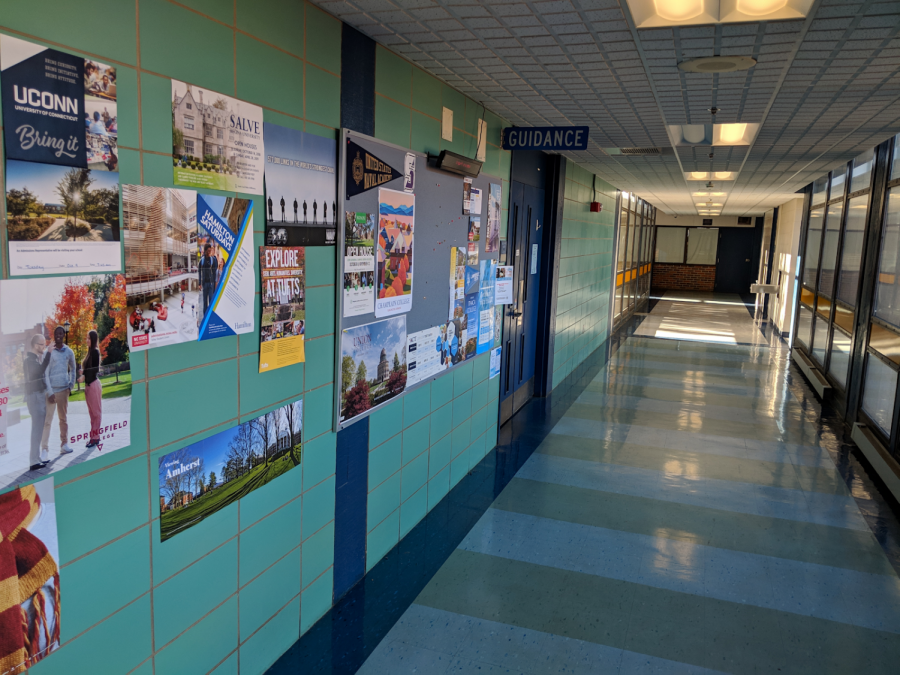(College) Deadlines, Deadlines, Deadlines!
Tips for Applying to College
The board outside of guidance with numerous different colleges and universities displayed for students to see everyday as they walk through the halls. (Fish Picture)
November 9, 2018
With their final year flying by, seniors are beginning apply to colleges, some already making their decision on where they are going. All the decisions that are to be made can be intimidating, and choosing which schools to apply to can be difficult.
“Students should feel familiar with the tool of Naviance,” said Dr. Erik Champy when asked where students should start with the college application process. Naviance is a website that Triton works with to provide an easy-to-use tool that allows students to see colleges, careers, and more about them. The tool introduced is in the junior year for students, and guidance works to make sure students have a solid understanding of how everything works on the website.
Once students have an understanding of Naviance, college tours are a great next step, but how many should be toured? Does is matter when the campus is toured?
“Tour as many [colleges] as possible, because you really get a sense of what the campus and community is really about. If you can tour it on weekday when school is in session, you get the feel of the hustle and bustle,” said Ms. Karen Christian, another of the guidance counselors at Triton High, who works with students on a daily basis regarding their plans for college.
Connor Small and Thomas Powis, seniors at Triton High both wanted to know why there was so much involved in the application process for college. “They want to make sure that when they’re accepting a student, that that student is gonna be a good fit, so there’s a lot of different variables that come into play, not just is he a good student; is this a good person, is this the kind of person we want on our campus,” said Christian.
Champy had a similar response, saying “They wanna know who they’re getting; there has to be a certain level of commitment to academic achievement.”
There are so many different types of applications for schools, such as early action, early decisions, regular decision, and more. Early decision is a binding contract that says no matter what the price is, if a student gets accepted to a school, they are going to attend it. Early action is a competitive application that generally is due by the end of Autumn, but often times will yield more aid for the student. Rolling admission says that students can apply over a long time in the school year, and regular decision/action just gives students longer on those Early decision/action deadlines.
When asked about what he believed was best and most beneficial, Champy said “I think early action is certainly fine, because students come in with ideas and decisions, and it allows students to get that [stress] off their back. I would caution anyone about early decision because they are binding contracts.”
Christian had a similar idea, however she said that “I caution students on early action because it tends to be a smaller pool of applicants, so they [the college] can be a little bit more picky with who they choose [to get in].”
When asked why she decided to do such, she said “I wanted be free of the stress of applying to schools. With early action, I knew if the colleges accepted me earlier, and I didn’t have to worry about applying later in the year, as I would have with regular decision.” said Brittney Nalesnik, a freshman at the University of New Hampshire, who did all of her applications for early action in her senior year.
Deciding how many schools to apply to can be challenging. Often times, students find that they are interested in a multitude of schools, and have trouble deciding which ones to apply to. Christian said, “Five or six is a manageable number, because once you narrow it down, you can visit or revisit campuses and then make that final decision.”
Christian also said that what it really comes down to in the end is finances, even if you like one school than the other, if it’s cheaper, you may just end up going to the one that is more affordable for yourself. Champy said it is worrying seeing kids come out of college at 22 with hundreds of thousands of dollars in debt, and that is the scary reality of college; it will cost a lot, and you will come out on the end with debt.
College applications can be very stressful to anyone, but it is more stressful if you have little help and limited knowledge of the process. The students at Triton are lucky to have the resource of guidance counselors. If you ever have trouble with anything college related, even outside of the application process, you can always see your guidance counselor for advice and help. Christian and Champy, as well as all the other guidance counselors are able and willing to help any students at Triton.



